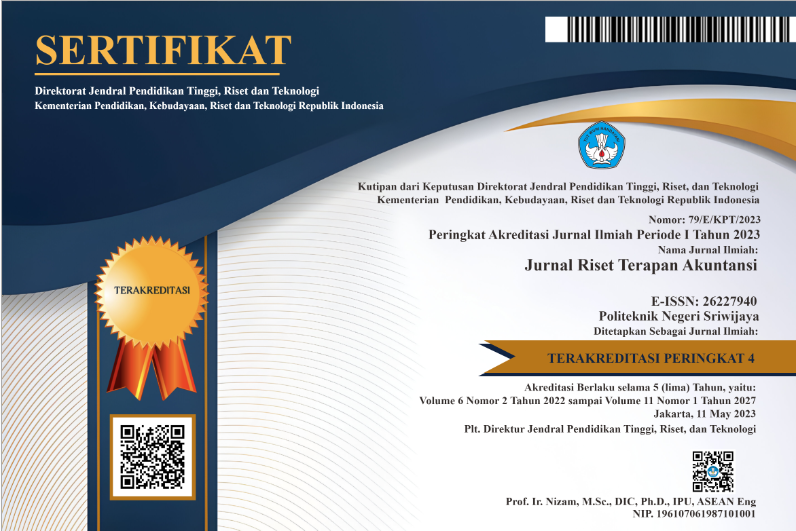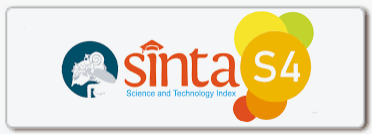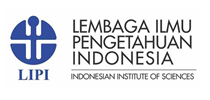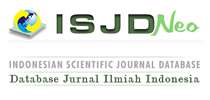ANALISIS TINGKAT PEMAHAMAN MAHASISWA TERHADAP KONSEP DASAR AKUNTANSI
DOI:
https://doi.org/10.5281/zenodo.3840830Keywords:
Basic Concepts of Accounting, Student’s of Poltesa..Abstract
The aims of Research Analysis Student’s Understanding Level about Basic Concepts of Accounting (Empirical Study on Registered Poltesa students had taken Basic Accounting Subject) are to measuring difference of comprehension and how student’s of Poltesa comprehension based on their background education (SMK / SMA / MA). Total respondens 155 students in 2014 using Kruskal Wallis test. Based on hypothesis test, assets and
liabilities variables in chi-square table statistic counted 41,784 > chi-square counted 1,089 and 41,784 > chi- square counted 1,026, probability significant value counted 0,395 > 0,05 and 0,708 > 0,05 then H1 and H2
REJECTED. There’s no significant difference about student’s comprehension of assets and liabilities concepts,
equity variable in chi-square table statistic counted 41,784 > chi-square counted 9,521, probability significant
value counted 0,021 > 0,05 then H3 ACCEPTED. Theres significant difference about student’s comprehension of equity concepts based on their background education. Based on that, students from SMK had the highest comprehension value of three variables. It concludes student’s from SMK more understand about Basic Concepts of Accounting. Therefore, student’s background education very influencing to take Basic Accounting subject at Poltesa.
References
Arikunto, Suharsimi, (2002) Penelitian Suatu Pendekatan
Khusus, Bina Aksara, Jakarta.
Cooper, D.R. and P.S. Schindler.,(2008) Business Research
Methods, 10th Ed. Boston, McGraw-Hill.
Effendi R, (2014) Accounting Principles: Prinsip-Prinsip
Akuntansi Berbasis SAK ETAP, Rajawali Press. Ghozali, I., (2011) Model Persamaan Struktural: Konsep
dan Aplikasi dengan Program AMOS 19.0. BP Universitas Diponegoro, Semarang.
Ghazali GM, (2011) Pengaruh Kualitas Vendor Dan Pengalaman Bertransaksi Terhadap Intensi Berkelanjutan Pengguna E-Commerce Dengan
Kepuasan dan Trust Sebagai Variabel Mediasi,
Magister Akuntansi, Universitas Gadjah Mada.
James M. Reeve, Carl S. Warren, dan Jonathan E. Duchac, (2013) Principles of Accounting: Billingual
Adaption, Salemba Empat,
Kieso Donald E & Weygant Jerry J, (2010) Accounting
Principles, Ninth Edition, New York: John Wiley & Sons Inc.
Keputusan Menteri Pendidikan Nasional Republik
Indonesia Nomor 234/U/2000 Tentang Pedoman
Pendirian Perguruan Tinggi
Munawir, S, (2004) Analisa Laporan Keuangan, Penerbit
Liberty, Yogyakarta.
Permendikbud Republik Indonesia Nomor 15 tahun 2013
Tentang Pendirian Politeknik Negeri Sambas. Reinstein, Alan & Bayou, Mohammad E. (1997) Critical
Thinking in Accounting Education: Processes Skills
and Aplication. Management Auditing Quarterly. Surat Keputusan Menteri Pendidikan dan Kebudayaan
Republik Indonesia No. 384/E/O/2014 Tentang Ijin Operasional Enam Pogram Studi Dilpoma Empat Politeknik Negeri Sambas.
Sugiyono.,(2009) Metode Penelitian Bisnis, Alfabeta,
Bandung, 2008.
-------; Metode Penelitian Kuantitatif, Kualitatif, dan R&D,
Alfabeta, Bandung,
Sar’i, (2010) Analisis Tingkat Pemahaman Mahasiswa
Akuntansi Terhadap Konsep Dasar Akuntansi (Studi Empiris Pada Mahasiswa Akuntansi S1 Uin Suska Riau Yang Berasal Dari Latar Belakang Sekolah Menengah Yang Berbeda), Simposium Nasional Akuntansi, Purwokerto.
Undang-Undang Republik Indonesia Nomor 12 tahun 2012
Tentang Pendidikan Tinggi.
Whitten, Jeffrey L, et al, (2014) Metode Desain & Analisis
Sistem, Edisi 6, Edisi International, Mc GrawHill, ANDI,Yogyakarta.















